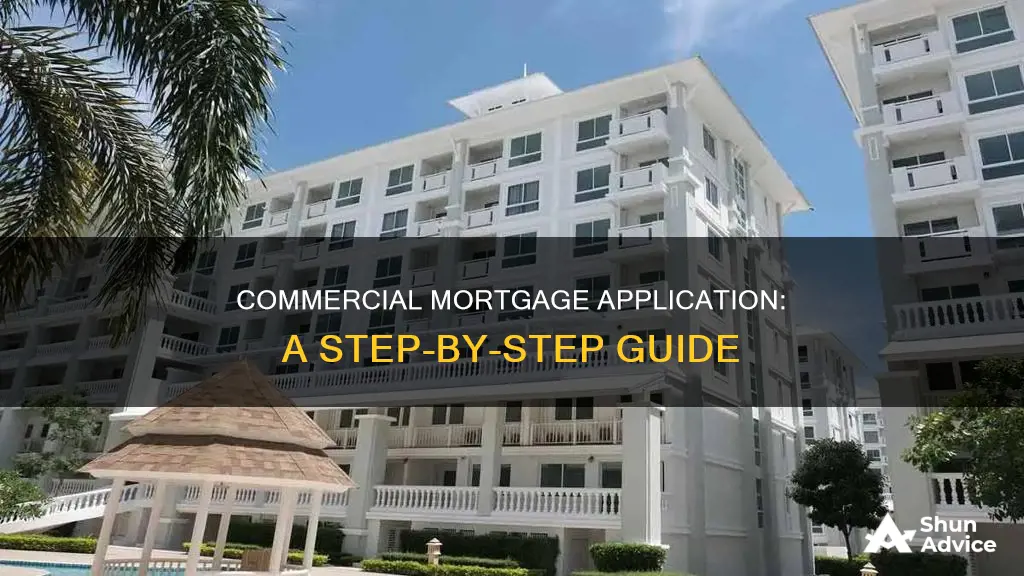
Applying for a commercial mortgage can be a complex process, but it's a familiar path for many businesses that are expanding or setting up a new workspace. Commercial mortgages are used to purchase a commercial premises, such as a property to rent out for extra income, or a property that is half business and half residential. The process involves making an initial application, undergoing valuations, and dealing with legal requirements. Before applying, it's important to be aware of the various factors that lenders consider, such as credit scores, income, and the value of the property.
| Characteristics | Values |
|---|---|
| Purpose | To purchase a commercial premises |
| Options | Work with a broker or talk directly to your bank |
| Requirements | Credit score, business cash flow, income declaration, security, documentation, etc. |
| Process | Initial application, valuations, legal procedures, application outcome, terms and conditions |
| Outcome | Purchase of the commercial property |
What You'll Learn

What is a commercial mortgage?
A commercial mortgage is a lending product used to purchase a commercial property. It is similar to a traditional mortgage, but instead of borrowing money to buy a residential property, you secure land or property for commercial purposes. Examples of commercial properties include office buildings, industrial warehouses, shopping centres, and commercial buildings or land zones for commercial use.
Commercial mortgages are typically taken out by a special purpose entity, such as a corporation or LLC, rather than an individual. This allows the lender to foreclose on the property in the event of a default, even if the borrower goes bankrupt. The loan amount is generally determined based on the loan-to-value (LTV) and debt service coverage ratios. The higher the LTV, the higher the interest rate. Traditional commercial mortgage loans given by banks offer fixed and variable rates, typically between 5% and 7%.
Commercial lending institutions will look at the credit of the guarantor or borrower, the commercial property's cash flow, and the collateral. The debt that a business carries is weighed against its cash flow, with banks wanting to see a minimum of 20% higher net income than debt. The normal range for the debt service coverage ratio is between 1.1 and 1.4.
The process of acquiring a commercial mortgage can be rigorous and time-consuming, often taking months to close. Lenders may impose hidden costs, such as application fees, legal fees, and survey and appraisal charges. It is important to be accurate with your income declaration, as providing misleading information may lead to your application being declined.
Adding Your Daughter to Your Mortgage: What You Need to Know
You may want to see also

How to apply for a commercial mortgage
Applying for a commercial mortgage can be a complex process, but it can be an essential step for businesses looking to expand or acquire new premises. A commercial mortgage is a lending product used to purchase a commercial property, such as a workspace or a rental property. Here is a step-by-step guide on how to apply for a commercial mortgage:
Step 1: Understand the Process and Requirements
Before starting your application, it is important to understand the commercial mortgage process and the requirements of lenders. Commercial mortgages are often used to finance the purchase of commercial real estate, and they come with higher risks and more stringent lending guidelines than residential mortgages. The requirements may vary depending on the lender, but generally, they will assess the creditworthiness of the borrower, the cash flow of the business, and the value of the commercial real estate being offered as collateral. It is also worth noting that commercial mortgages tend to have higher down payment amounts.
Step 2: Gather Essential Documents
When applying for a commercial mortgage, you will need to provide various documents to the lender. These may include basic application information, recent bank statements, liability and asset statements, income tax returns, financial statements, and details of the commercial property you intend to purchase. If the property is an investment property, you may also need to provide details of the tenant and a copy of the lease. Preparing these documents in advance can increase your chances of a successful application.
Step 3: Choose a Lender and Apply
You can choose to work with a broker or approach a bank directly for your commercial mortgage. A broker can offer a wider range of options and is useful if your cash position is borderline. However, if you have a strong relationship with your bank, going directly to them can also be beneficial. Once you have selected a lender, submit your application along with the required documents.
Step 4: Follow Up and Finalize
After submitting your application, the lender will review your documentation. If your application is successful, you will be contacted to discuss the outcome, terms and conditions, and any further steps. You may be assigned a relationship manager who will support you throughout the process and ensure they understand your goals and needs. Once all the conditions are met, the funds will be released to your business bank account.
Adding Your Name to a Mortgage: What You Need to Know
You may want to see also

Documents required for a commercial mortgage
The exact documents required for a commercial mortgage will vary from lender to lender, but there are some common documents that are usually required for most applications. These include basic contact information, such as names and addresses, as well as details about your business, such as its name, type, and address. If you have a Companies House number, providing this can also streamline the process.
Lenders will also want to assess your financial situation and the affordability of the loan. For this, they may request 2 years of trading accounts, 6 months of business bank statements, and details of any likely changes to your future turnover or profit. If you are a startup or your business is less than 12 months old, you can provide an aggregated amount based on your current trading performance. Lenders may also request tax returns, income statements, and balance sheets for the last 3 to 5 years.
If you are applying for a mortgage on an investment property, you will likely need to provide details of the tenant and a copy of the lease. You may also be asked for tenant financial statements and payoff information, including contact information, payoff statements, and payment history.
For all types of commercial mortgages, lenders will also want to know about any other investment properties you own. This includes the address, property value, amount owed, rental income, lease length, and monthly mortgage payment. This information gives the lender an insight into the overall health of your portfolio.
Finally, some lenders may also request additional documents such as property photos, personal financial statements, and capital improvements summaries. It is always best to be prepared and have these documents ready, as it can help create a strong first impression and increase your chances of approval.
Adding a Co-Borrower to Your Connecticut Mortgage: What You Need to Know
You may want to see also

Commercial mortgage brokers
Commercial mortgages can be a tricky business, so it's always good to have some help. That's where commercial mortgage brokers come in. They can access more lending products than you could on your own and have a wider view of the market, which is great if you're looking for a breadth of options. If your cash position is borderline when it comes to your loan-to-value ratio (the size of your deposit), it might be best to chat to a broker. They can offer unique insights and help you navigate the process, from the initial application to valuations and legalities.
Brokers will often have a marketing plan in place to send you great deals, and they can help you get funding based on the deal. They can also provide you with a comprehensive guide to the commercial mortgage application process, so you know what to expect. This can help you speed up the process and avoid surprises.
When choosing a broker, it's essential to select one with experience and a good reputation. For example, Select Commercial has over 30 years of lending experience and a reputation as a top-tier broker in Atlanta. They offer simplified application processes, competitive rates, and 24-hour pre-approvals with no upfront costs or obligations.
If you're unsure about working with a broker, you can also talk directly to your bank. If you have a relationship manager, they can answer any questions you may have. Using your financial network and consulting your accountant, broker, and bank can provide valuable insights to help you make an informed decision.
QuickBooks Mortgage Management: Adding a Property Mortgage
You may want to see also

Commercial mortgage vs residential mortgage
Commercial and residential mortgages are two distinct types of mortgage loans with different requirements, risks, and repayment options.
The primary difference between the two is the purpose of the loan. A commercial mortgage is used to purchase a commercial property, such as an office building or a strip mall, while a residential mortgage is for buying a home. The type of property determines the mortgage type, but there are variations within each category. For instance, a residential apartment building with five or more units may be financed with a commercial mortgage.
Qualifying for a residential mortgage often depends on the borrower's income, with lenders wanting assurance that the borrower's income is higher than what they owe. The borrower's mortgage payments can only be up to 28% of their gross income. In contrast, a commercial mortgage is backed by the income generated by the investment property itself. Lenders must predict the success of the borrower's business, which is challenging and makes commercial mortgages riskier.
Commercial mortgages often come with higher down payments, usually about 20%, compared to 5-15% for residential mortgages. Repayment periods are longer for residential mortgages, typically 15-30 years, while commercial loans are amortized over shorter periods, often 10 years, resulting in higher monthly payments. Residential loans usually have fixed interest rates, whereas commercial loans tend to have variable rates that can increase the borrower's payments if market interest rates rise.
When applying for a commercial mortgage, borrowers can work with a broker or approach their bank directly. A broker may offer a wider range of options, especially if the borrower's cash position is borderline. The application process involves providing basic contact information, business details, and turnover figures. Lenders may also request income tax returns and financial statements for the last 3-5 years. After reviewing the documentation, the lender will discuss the application outcome, terms, and any next steps.
Adding Your Spouse to Your Mortgage: What You Need to Know
You may want to see also
Frequently asked questions
A commercial mortgage is a lending product used to purchase a commercial premises. It is a familiar process for many businesses that have successfully grown and are setting up a new workspace or looking to expand beyond their existing business property.
You can either work with a broker or talk directly to your bank. A broker can access more lending products than you could on your own and will have a wider view of the market. If you have a relationship manager at your bank, they can be the perfect conduit for any questions. You will need to provide the lender with several documents before agreeing on the loan. These include basic application information, recent bank, liability, and asset statements, and income tax returns.
Commercial lending institutions typically look at the credit of the guarantor/borrower, commercial real estate property cash flow/business cash flow, and the commercial real estate property collateral. The debt that a business carries is weighed against the cash flow of the business, for which most banks want to see a minimum of 20% higher net income than debt carried.
Commercial mortgages can be offered for most legal businesses. A part-commercial mortgage is a mortgage for a property that is half business and half residential, such as a flat above a shop. These types of properties often fall outside standard residential or commercial mortgage lender terms, so they need a unique mortgage product.
After submitting your application, you will receive your quotations and your relationship manager will collect any further information that is required. Once all the documentation has been returned and any conditions are satisfied, your relationship manager will confirm that funds have been paid to your business bank account.







